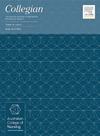生成式人工智能在护理中的应用:综述
IF 1.7
4区 医学
Q2 NURSING
引用次数: 0
摘要
生成式人工智能(AI)正在迅速改变多个行业,通过教育、实践和研究的进步,它有可能彻底改变护理行业。然而,生成式人工智能在护理中的应用仍未得到充分探索,这凸显了对其当前影响和未来影响进行全面审查的必要性。目的探讨生成式人工智能在护理教育、实践和研究中的现状和意义。方法本综述遵循Arksey和O 'Malley的方法框架,并由Levac及其同事改进。检索2020年1月至2024年4月间发表的文章的数据库包括PubMed、Embase、CINAHL、PsycINFO、Cochrane Library和IEEE explore。共纳入4858篇文献,其中23篇纳入本综述。所选研究大部分发表于2024年(n = 19/23),主要在美国进行(n = 8/23),主要为定量描述性研究(n = 14/22)。ChatGPT是最常用的工具,出现在95.7%的研究中(n = 22/23)。这些文章涉及各个护理领域,包括护理教育(n = 12/23)、实践(n = 10/23)和研究(n = 1/23)。确定了与该技术相关的好处和问题。生成式人工智能在改变护理教育、实践和研究方面显示出巨大的希望;然而,它的整合仍处于早期阶段。为了充分利用生成式人工智能的优势,护理专业人员必须应对与人工智能相关的挑战,并引领其伦理应用。严谨的研究和积极的领导对于实现生成式人工智能在护理中的潜力至关重要。本文章由计算机程序翻译,如有差异,请以英文原文为准。
Generative artificial intelligence in nursing: A scoping review
Background
Generative artificial intelligence (AI) is rapidly transforming multiple sectors, with significant potential to revolutionise nursing through advancements in education, practice, and research. However, the application of generative AI in nursing remains underexplored, highlighting the need for a comprehensive review of its current impact and future implications.
Aim
To investigate the current state and implications of generative AI in nursing education, practice, and research.
Methods
This scoping review was conducted following the methodological frameworks of Arksey and O’Malley, refined by Levac and colleagues. The databases searched for articles published between January 2020 and April 2024 included PubMed, Embase, CINAHL, PsycINFO, Cochrane Library, and IEEE Xplore.
Findings
A total of 4858 articles were identified, with 23 included in this review. Most of the selected studies were published in 2024 (n = 19/23), primarily conducted in the United States (n = 8/23), and largely consisted of quantitative descriptive studies (n = 14/22). ChatGPT was the most frequently used tool, appearing in 95.7% of the studies (n = 22/23). The articles addressed various nursing domains, including nursing education (n = 12/23), practice (n = 10/23), and research (n = 1/23). Both the benefits and concerns associated with this technology were identified.
Discussion
Generative AI shows great promise for transforming nursing education, practice, and research; however, its integration is still in the early stages.
Conclusion
To fully leverage the benefits of generative AI, nursing professionals must address the challenges associated with AI and lead its ethical adoption. Rigorous research and proactive leadership are crucial to realising the potential of generative AI in nursing.
求助全文
通过发布文献求助,成功后即可免费获取论文全文。
去求助
来源期刊

Collegian
NURSING-
CiteScore
2.70
自引率
6.70%
发文量
127
审稿时长
72 days
期刊介绍:
Collegian: The Australian Journal of Nursing Practice, Scholarship and Research is the official journal of Australian College of Nursing (ACN).
The journal aims to reflect the broad interests of nurses and the nursing profession, and to challenge nurses on emerging areas of interest. It publishes research articles and scholarly discussion of nursing practice, policy and professional issues.
Papers published in the journal are peer reviewed by a double blind process using reviewers who meet high standards of academic and clinical expertise. Invited papers that contribute to nursing knowledge and debate are published at the discretion of the Editor.
The journal, online only from 2016, is available to members of ACN and also by separate subscription.
ACN believes that each and every nurse in Australia should have the opportunity to grow their career through quality education, and further our profession through representation. ACN is the voice of influence, providing the nursing expertise and experience required when government and key stakeholders are deciding the future of health.
 求助内容:
求助内容: 应助结果提醒方式:
应助结果提醒方式:


